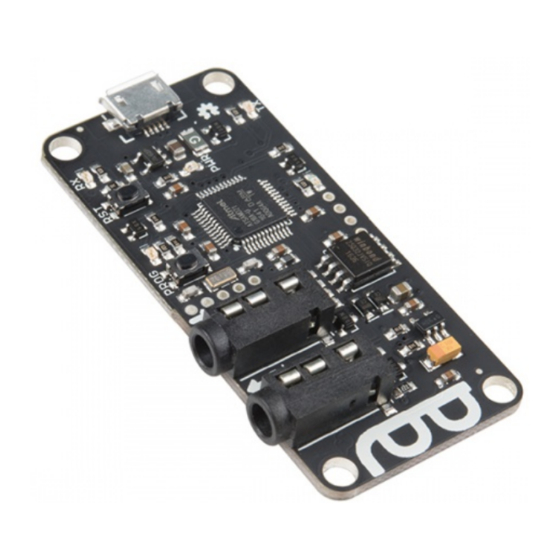
Advertisement
Quick Links
Page 1 of 16
Spectacle User's Guide
Introduction
Spectacle is a product ecosystem centered around a simple idea: creative
people shouldn't have to learn new skills to use electronics in their projects.
You've spent years developing the skills you use, and SparkFun wants to
recognize that and help you expand your creations to include electronics
without requiring you to spend years learning about electronics and
programming.
Spectacle launched with six modules: the Director Board, an Audio Output
Board, a Motor Control Board, a Lighting Control Board, an Inertia Sensing
Board, and a Button Input Board. Every Spectacle project consists of at
least two boards: one Director Board and at least one of the output-type
modules.
Director Board
Spectacle Director Board
DEV-1391 2
Advertisement

Summary of Contents for sparkfun Spectacle
- Page 1 Spectacle launched with six modules: the Director Board, an Audio Output Board, a Motor Control Board, a Lighting Control Board, an Inertia Sensing Board, and a Button Input Board. Every Spectacle project consists of at least two boards: one Director Board and at least one of the output-type modules.
- Page 2 Spectacle Audio Board DEV-1403 4 The Audio Output Board adds the ability to play sounds from a Micro SD card to your Spectacle system. It provides a line-level output ready to be amplified. Motor Control Board Spectacle Motion Board ...
- Page 3 Page 3 of 16 Spectacle Light Board DEV-1405 2 The Light Board controls strands of addressable LEDs, allowing it to realize quite a few interesting effects that otherwise wouldn’t be possible. Inertia Sensing Board Spectacle Inertia Board DEV-1399 2 The Inertia Sensing Board allows you to trigger events on motion, stillness, or orientation.
- Page 4 To enter programming mode, press and hold the RST button, press and hold the PROG button, and then release the RST button. Power for your Spectacle system is delivered via a Micro USB jack on the Director Board. Power is then delivered to additional boards in the system...
- Page 5 10 seconds between playback. Here we see the opening screen of the Spectacle App. The default name (in this case) is “my talented project” but you can, of course, change this to be anything that you’d like.
- Page 6 Page 6 of 16 You’ll now see a list of the various types of boards which are currently available. We’ve discussed five of these six entries, and we’ll cover what a virtual board is in a second. For now, just click on “Audio” to add our Audio Output Board.
- Page 7 Page 7 of 16 Unsurprisingly, it’s empty. We have to add something! At the bottom of the page, find the “ADD AN ACTION” button. Click it and a list of actions will descend from the top of the page. For the Audio Output Board, only two options exist: “Cancel” and “Play Sound”.
- Page 8 Page 8 of 16 You’ll find this screen has appeared. There are four blanks, for four user inputs, and a slider at the bottom which we’re going to ignore. Here are the uses of the other fields. * “Listen to channel number…” - This is the channel number which triggers the audio to start playing.
- Page 9 Page 9 of 16 Here are the settings to put into the fields. Note that we are listening on channel 0, as we’ll need that information later. We want to play our sound immediately, play sound file 00.ogg, and not interrupt that sound for at least one second.
- Page 10 Page 10 of 16 We’re back at the list of boards. This time, we’re going to add a virtual board. This special subset of “boards” adds functionality that otherwise isn’t added by any particular hardware board. Now a virtual board entry appears in our project list. The Virtual Board entry is special, in that it can only exist once in the boards list, and it will always “sink”...
- Page 11 Page 11 of 16 When you click on “ADD AN ACTION”, you’ll see a greater variety of options than you did with the Sound Board. The first four allow for input signals from external boards to be combined or changed in some way, while the bottom four require no external hardware to use.
- Page 12 Page 12 of 16 Congratulations! You’ve just finished setting up the configuration for our random sound player! Programming the system Programming the system is done via your headphone output jack. Plug one of the included 3.5mm cables into the headphone jack on your computer, smartphone, or tablet, and plug the other end into the “Program”...
- Page 13 Spectacle Concepts Momentary versus continuous events Some events in Spectacle will generate a “one-and-done” pulse, and some will generate a continuous signal. What happens with these signals depends upon what sort of action the signal is connected to.
-
Page 14: Troubleshooting
Spectacle project. Board order is wrong A limitation of the Spectacle application and system is that the boards must be attached to the Director Board in the same order in which they appear in the application list. This means that a system with a Button Board as the... -
Page 15: Insufficient Power
The solution here is simple: try installing again. If your volume is all the way up, it’s possible that your device can’t make a strong enough signal to work with Spectacle. This may be especially true of cellular phones in the EU, where maximum volume output is limited by statute. - Page 16 Spectacle Example: Super Hookup Guide Mario Bros. Diorama Everything you need to know about A study in building an animated using the Spectacle Inertia Board in diorama (with sound!) using one place. Spectacle electronics. Spectacle Motion Kit Spectacle Button Board...




Need help?
Do you have a question about the Spectacle and is the answer not in the manual?
Questions and answers